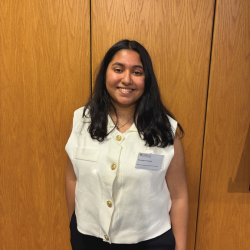
Submitted by la334 on Thu, 16/10/2025 - 10:58
By Millie Price
Every summer, a group of undergraduate students from across the UK and Ireland come together—virtually and in person—to take their first steps into the world of postgraduate research. For many, this is a world they never thought they could belong to.
Welcome to Summer CAMP (Cambridge Access to Mental Health & Psychology): a 3-week virtual programme with a 2-day residential at the University of Cambridge, designed to support undergraduates from underrepresented backgrounds to pursue postgraduate study and academic careers.
How It Started
Summer CAMP began in 2021, founded by two Cambridge students, Nina Lutz and Martine Skumlien, who recognised that certain groups of students were consistently underrepresented in postgraduate education and academic pathways.
What started as a student-led initiative in the Department of Psychiatry has now run successfully for four years—each year welcoming 20–30 undergraduates eager to explore research, connect with mentors, and demystify academia.
The idea was simple but powerful: to give students the skills, confidence, and representation they need to see themselves in academia.
What We Do
Each participant in Summer CAMP is paired with a supervisor—usually a Cambridge PhD student or early-career researcher—who guides them in developing a realistic research proposal over the course of the programme. Alongside this, students attend optional lectures, workshops, and panel discussions covering everything from research methods and academic writing to mental health and career pathways.
The camp is aimed at undergraduates from universities in the UK or Ireland (excluding Oxford and Cambridge) who meet one or more of the following widening participation criteria:
-
First generation in their family to attend university
-
From an ethnic minority background
-
Have sought asylum in the UK and/or identify as a refugee
-
Eligible for free school meals
-
Have experienced illness or disability affecting education
-
Have been, or are currently, in care or a carer
These criteria reflect the structural and practical barriers that many talented students face when considering postgraduate education. Summer CAMP aims to dismantle those barriers through skills-based learning, representation, and community.
A New Chapter: The Residential
In 2024, we added a 2-day in-person residential in Cambridge for the first time. This new component brought together participants and supervisors for the first time face-to-face. Students presented their research proposals, explored the city, and experienced university life beyond the screen.
The impact was immediate.
In post-programme feedback, 95% of students rated the residential 5/5, with many describing it as a highlight of their summer.
One student shared:
“The most unexpected experience that I will keep with me for a long time was the residential – people kept repeating that we should not talk ourselves out of rooms we deserve to be in, and that we all have a place within academia. It gave me the motivation to keep going. Hearing stories from successful researchers from similar backgrounds as me was representation I really needed to see.”
For many, this was their first time visiting Cambridge—and the experience of being welcomed, supported, and celebrated within its academic spaces was profoundly empowering.
Why It Matters
Representation and mentorship matter deeply in shaping who feels able to pursue research careers. Summer CAMP directly addresses the social and psychological barriers that keep underrepresented students from applying to postgraduate programmes.
Through personalised supervision, diverse speaker panels, and a strong peer community, the camp shows students that there is a place for them in academia—and that their perspectives are not only valid but valuable.
Real Impact: From Summer CAMP to Cambridge
The long-term success of Summer CAMP is reflected in the journeys of its alumni. One inspiring example is Devangana Prasad, who attended Summer CAMP as an undergraduate participant and is now studying on the MPhil in Foundations of Clinical Philosophy at Cambridge.
Devangana’s story highlights the transformative potential of the programme. She credits Summer CAMP with giving her the confidence and practical insight to apply for postgraduate study:
“Summer CAMP showed me that people like me do belong here. It helped me see postgraduate study not as something distant, but as something achievable.”
Her success exemplifies what Summer CAMP strives for — turning encouragement into opportunity, and access into academic achievement.
Looking Ahead
As we prepare for Summer CAMP 2025, our priority is to secure funding to sustain the residential program, ensuring that every student continues to benefit from this transformative experience.
Applications will open at the end of March 2025, with the programme running from mid-August to early September. Like previous years, it will remain entirely volunteer-run by students and researchers within the Department of Psychiatry.
By maintaining this grassroots, community-led spirit, Summer CAMP continues to show what is possible when students support one another to open doors that once seemed closed.
Interested in Supporting or Learning More?
To find out more about Summer CAMP or to explore partnership and funding opportunities, please contact: mp905@cam.ac.uk

